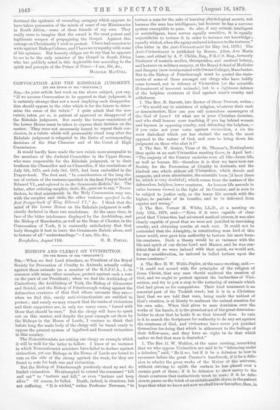CONVOCATION AND THE RIDSDALE JUDGMENT. [TO TRH EDITOR OF TIM
"8nful...km:1 Si,—In your article last week on the above subject, you say, "If we assume Convocation to be opposed to that judgment, it is certainly strange that not a word implying such disapproba- tion should appear in the rider which is for the future to deter- mine the sense of the rubric." I quitn admit that the new rubric, taken per se, is patient of approval or disapproval of the Ridsdale judgment. But surely the former resolutions of the Lower House must be taken to express their decision on the matter. They were not necessarily bound to repeat their con- clusion, in a rubric which will presumably stand long after the Ridsdale judgment is relegated to the limbo of corresponding decisions of the Star Chamber and of the Court of High Commission.
It would hardly have made the new rubric more acceptable to the members of the Judicial Committee in the Upper House, who were responsible for the Ridsdale judgment, or to their brethren the Chancellor and ex-Chancellor, if the resolutions of July 5th, 1875, and July 3rd, 1879, had been embedded in the Prayer-book. The first said, "In consideration of the long dis- use of certain of the vestures specified in the first Prayer-book of Edward VI., and referred to in the Ornaments Bubric," &c. The latter, after ordering surplice, stole, Sm., goes on to say, "Never- theless, he that ministereth in the Holy Communion may use, with the surplice and stole, the other vestures specified in the first Prayer-booh of King Edward VI.," &c. I think that the mind of the Lower House on the Ridsdale judgment is suffi- ciently declared in these two resolutions. At the same time, in face of the bitter intolerance displayed by the Archbishop, and the Bishop of Manchester, as well as the Dean of Chester, in the Convocation of York, it is eminently satisfactory that that body thought it best to leave the Ornaments Rubric alone, and to beware of all " understandings."—I am, Sir, Ste.,


































 Previous page
Previous page